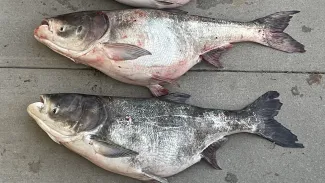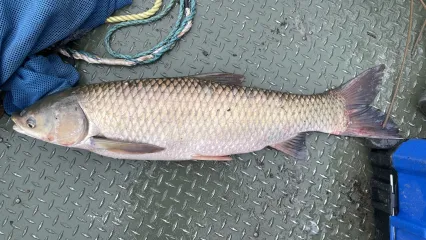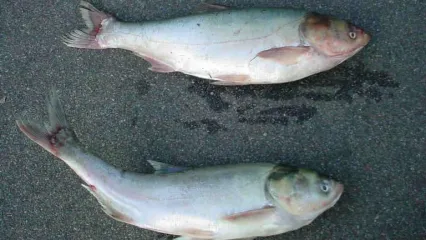
Description
**INVASIVE!**
Small bighead carp and silver carp resemble gizzard shad. Cast-netting for bait in tailwaters below some major reservoirs in Oklahoma has the potential to introduce invasive carp into some of the premier sportfishing lakes in the state. Anglers routinely cast net for bait below the Texoma Dam and use the bait to fish for striped bass or catfish in Lake Texoma. Invasive carp can be accidentally introduced into the lake through this practice. Bighead and silver carp have reproductive requirements like those of striped bass. There is a real potential to establish a reproducing population of invasive carp in Lake Texoma which could be devastating to striped bass fishery and paddlefish recovery efforts.
***The importation and possession of invasive carp are illegal in Oklahoma without the written consent of the ODWC Director.***
Habitat
The presence of bighead carp in Lake Hudson has been verified by ODWC biologists. Bighead carp have been reported from the Neosho River above Grand Lake and the Grand River below Grand Lake. They have also, been verified from the Red River below Lake Texoma and from the Kiamichi River below Hugo Lake.
The bighead carp utilizes open water areas, moving about in the surface zones of large lowland rivers, consuming large quantities of blue-green algae, zooplankton, and aquatic insect larvae and adults. Because of its feeding habits, bighead carp are a direct competitor with paddlefish, bigmouth buffalo, and gizzard shad; as well as with all larval and juvenile fishes and native mussels.
Life Cycle
Bighead carp, native to the large rivers of eastern China, were first brought to the U.S. in 1972 by a private fish farmer in Arkansas to improve water quality and increase fish production in culture ponds. Bighead carp first began to appear in open public waters in the early 1980's.
How To Observe
Key Identification
- Large deep-bodied, laterally compressed (narrow) with a very large head
- Very tiny scales on their body, head, and gill covers are scale-less
- Eyes are situated below the midline of the body
- Keel on the belly that extends only partway to the head
- Dark blotches along the back
What can you do to help stop the spread of invasive carp?
- Consult local conservation authorities about laws and regulations governing importation, culture, and stocking
- Ask your bait dealer where their baitfish came from and never release any unused baitfish to the wild
- Never release pet fish, bait fish, or aquatic organisms from the home aquarium to public water
If you think you have discovered any invasive species contact us at (918) 200-4815 or report online.


